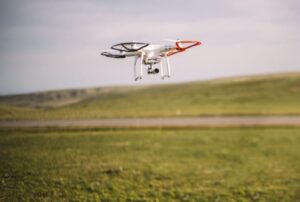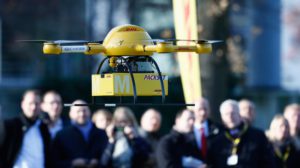The Future of Lithium Battery Technology in Drone Innovation in the USA
1Up Aerial Drone Services, Inc., a subsidiary of American Infrastructure Group, Inc. – December 2024
Drones, or unmanned aerial systems (UAS), have become integral to industries like agriculture, logistics, defense, and environmental monitoring in the USA. One of the most significant developments powering these versatile devices is the evolution of lithium battery technology. As of 2023 and 2024, advancements in lithium battery capabilities are driving performance improvements for drones, addressing challenges like flight time, payload capacity, and energy efficiency.
Key Improvements in Lithium Battery Technology
- Increased Energy Density
Lithium-ion batteries have seen remarkable progress in energy density, allowing drones to carry heavier payloads and operate for extended periods without increasing battery size or weight. Innovations in cathode materials, such as the incorporation of silicon or lithium-sulfur, have been instrumental in achieving this milestone.
lithium-sulfur, have been instrumental in achieving this milestone. - Faster Charging Technology
The introduction of fast-charging systems ensures that drone operators spend less time waiting for batteries to recharge. By leveraging advanced electrolyte formulations and thermal management systems, manufacturers are reducing charging times without compromising battery longevity. - Durability and Safety Enhancements
Battery safety is a critical concern, especially for drones used in sensitive operations like disaster response or urban deliveries. Modern lithium batteries now feature enhanced thermal stability, preventing overheating and reducing the risk of fires. Solid-state lithium batteries, which replace flammable liquid electrolytes with solid materials, are paving the way for safer and longer-lasting energy solutions. - Extended Lifespan
To minimize operational costs, drones require batteries with extended lifecycle capabilities. Advanced cycle management algorithms and improved electrode designs have significantly increased the number of charge-discharge cycles a lithium battery can endure, making them more cost-effective and reliable for commercial applications.
Applications Driving Demand for Advanced Lithium Batteries
- Delivery Drones
Companies like Amazon and Walmart are scaling up drone delivery programs, which demand batteries capable of supporting longer flights and high payloads while maintaining safety standards. - Agricultural Drones
Precision agriculture relies on drones to monitor crops and distribute fertilizers or pesticides. Lithium batteries with higher capacities enable these drones to cover larger areas without frequent recharges. - Defense and Surveillance
Military drones need batteries with enhanced energy density to support sophisticated onboard systems like sensors, cameras, and communication devices for extended missions. - Environmental Monitoring
Scientists deploying drones for mapping, wildlife monitoring, or climate data collection benefit from the durability and reliability of next-generation lithium batteries.
Emerging Technologies on the Horizon
Looking ahead, the integration of artificial intelligence with battery management systems is expected to optimize drone performance further. AI can dynamically adjust power consumption and improve energy efficiency based on real-time drone operations.
Additionally, researchers are exploring recycling technologies and second-life applications for lithium batteries, addressing environmental concerns associated with the growing use of these devices. Efforts in developing wireless charging solutions could also revolutionize drone operations by enabling in-flight recharging.
How Newer Battery Technologies Will Benefit Drones
 The continued evolution of battery technology promises to unlock new possibilities for drones in the coming years. With further advancements in solid-state and lithium-silicon batteries, drones will achieve significantly longer flight times and increased operational ranges, expanding their potential use cases.
The continued evolution of battery technology promises to unlock new possibilities for drones in the coming years. With further advancements in solid-state and lithium-silicon batteries, drones will achieve significantly longer flight times and increased operational ranges, expanding their potential use cases.
Moreover, lightweight, high-energy-density batteries will allow drones to handle heavier payloads, making them indispensable for industries like logistics and emergency response. Enhanced safety features and improved charge cycles will reduce the frequency and cost of battery replacements, improving the overall efficiency of drone fleets.
As battery innovation progresses, drones will become more autonomous, dependable, and adaptable to a wide range of tasks, from delivering critical medical supplies to conducting detailed geological surveys. These breakthroughs will not only enhance the performance of existing drone systems but also foster entirely new applications, further solidifying drones as a transformative technology in the USA and beyond.
Conclusion
The advancements in lithium battery technology over the past two years underscore the pivotal role of energy innovation in shaping the drone industry. As these improvements continue, drones powered by cutting-edge batteries will redefine possibilities across various sectors in the USA, from logistics to defense, driving efficiency and sustainability in the process.
Looking for lithium batteries for your drone? We’ve got you covered! Check out our selection in our Drone Store!


